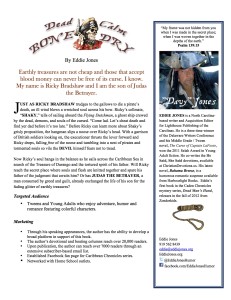Step One: Take a Breath
Sometimes at conferences authors get so jazzed up with the appointment that they aim a fire hose in the face of faculty. They’ve been told they only get a couple of minutes to make that pitch and get the editor or agent’s attention, so they come prepared with their one-sheet and proposal but then forget to take a breath.
Often, the faculty wants to know more about the person sitting across the table than they do the project. This is a relationship business. No matter how good the pitch or project, or even how well you write, if the editor or the agent doesn’t feel they can build a rapport with that author and establish a relationship, they may not be that jazzed about the project anyway. So slow down and breathe.
Step Two: Bring Your One Sheet
Bring your one-sheet. And bring your proposal if you have it. Do not expect the editor or agent to take that proposal with them. In fact, most of us may not even take your one-sheet. But it’s good for you to have both because we’re going to ask questions and you’re going to need to refer to that proposal or that one-sheet to answer those questions. We may ask what your marketing plan is and you need to be able to quickly flip to that section of your proposal and give us that information. How many Facebook friends do you have, Twitter followers, what’s your Pinterest reach, are you on Goodreads? What’s your platform and can you market the book? We may ask those questions. You need to be able to get your hands on that information quickly.
Each editor and agent looks at a one-sheet a little bit differently. I take about a minute to read over the sheet and I approach it like a reader might in a bookstore. I tell authors to imagine they are in a Barnes and Noble. They are standing in front of a bookshelf. Pick up a book and scan the front cover. That’s going to give the title, the author, and if there’s a tagline that goes with that title. The one that comes off the top of my head is – I think it was the second Jaws movie – “just when you thought it was safe to go back in the water”. That’s a killer tag line.
So you have your title, your tagline, your author name, and probably in some cases you have some visual elements that hints at what the cover might look like. It’s not that you’re designing the cover, but if it’s a romantic beach read you’re probably going to have picture of a sunset or a sunrise at a beach, or people walking on the beach. But you don’t have to do it this way. Some editors and agents don’t want to see visual.
Next, it’s that back cover copy. What is the promise of the book, what is its premise? Is there a payoff for the reader? If I’m interested in that book I’ll ask for more – as would a reader. That’s the power of a one-sheet.
Step Three: Be Prepared to Email Your One Sheet or Proposal
Most editors and agents that come to conferences are flying in, so they just don’t have room to take printed copies of anything back with them. Often, we will ask a conferee to email us the proposal or the one-sheet as an attachment. If you’ve got it on a flash drive, that’s good too. When I go to conferences if somebody gives me a flash drive I take that back to the room and transfer it to my laptop, and then I have it with me. For me that’s really helpful because I’m flying to conferences, and if I’ve got the proposal when I leave the conference, or the one-sheet, then in the airport and on the plane I can kind of look over a lot of what I’ve just talked with an author about, and make a decision before I get home. If I don’t do it while I’m in the air then it may be months before I get back to that author.
Step Four: Know in Advance What a House is Looking For
If an editor is not looking for the project that you’re pitching, be respectful of that and don’t argue with the editor. Most major houses have their submission guidelines up on the site, so you know what they’re interested in purchasing before you get to the conference.
Step Five: Watch the Time
Editors and agents want to give your their undivided time, but they have also been asked by the conference director to stay on schedule. Make it your job to watch the time for them. Trust me, editors and agents appreciate an author who knows the value of time and respects the 15-minute slots for ALL authors. Personally, when I find an author who helps me stay on-schedule I know that I’m looking across the table at a professional.
So there you are: pitch, breathe, listen, and leave on time.
Good luck at your next writers’ conference.
